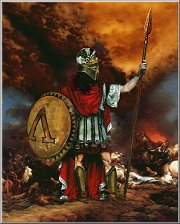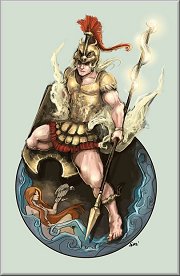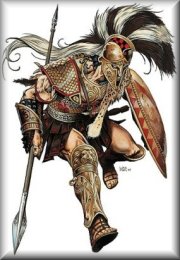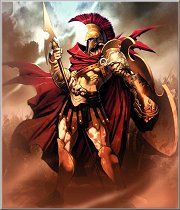MYTH MAN'S AWARD-WINNING HOMEWORK HELP
ARES, GOD OF WAR
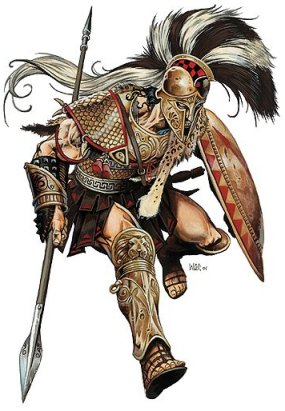
LATIN - MARS
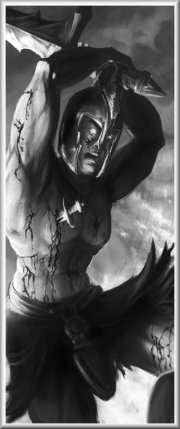
ARES BY ALYANA
MORTALS ASSOCIATED
WITH ARES
Ares was the God of War born in Thrace, and the son of Zeus and Hera, both of whom, according to the ancient poet Homer, detested him. He is hateful throughout the epic poem called the Iliad although it is a poem of war; rarely do soldiers in the Iliad "rejoice in the delight of Ares’ battle," but far oftener they were happy to "escape the fury of the ruthless god." Homer calls him murderous, bloodstained, the incarnate curse of mortals and, strangely, also a coward; who bellows with pain and runs away when wounded.
Ares had an impressive escort when on the battlefield, his sister Eris (Discord), her son Strife, Phobos (Alarm), Metus (Fear), Demios (Dread), Pallor (Terror) as well as the Goddess of War, Enyo (Bellona in Latin). These attendants, or sometimes said to be his children, sympathized with his quarrelsome tastes and were delighted to follow his lead into battle; as they moved the voice of groaning arose behind them and the earth streamed with blood.
His sister Eris is always stirring up causes for war by spreading rumors and creating jealousies. Ares never favors one city or party more than another but fights for any side, delighting in the sacking of towns and the slaughter of humans.
Never sated with strife and bloodshed, Ares preferred the din of battle to all other music, and found delight in the toils and dangers of war. No gentle deeds of kindness were ever expected from him; no loving prayers were ever addressed to him; and the people had no affection for him, but rather shuddered with terror at the mention of his name.
The Romans, who glorified war and battle, liked Mars (Roman for Ares) much better than the Greeks liked Ares. He was never to them the mean, whining deity of the Iliad, but a magnificent and invincible warrior. The heroes of the Aeneid rejoiced when they saw that they were to fall "on Mars’ field of renown," they "rush on glorious death" and find it "sweet to die in battle." The Romans also worshipped Mars and Bellona together, in the same temples, and their altars were the only ones they ever polluted by human sacrifices.
Ares has tasted defeat - Athena, a far more skilled fighter than he, has twice beaten him in battle; and once the gigantic sons of Aloeus conquered and kept him imprisoned for thirteen months until, half-dead, he was released by Hermes. Another time Heracles (Hercules) sent him running in fear back to the safety of Olympus.
But Ares figures rarely in mythology, and he has no distinct personality like most other important gods, he was little more than a symbol of war. Ares was generally represented in a brilliant suit of armor, a plumed helmet on his proud young head, a poised spear in one muscular hand and a finely wrought shield on the other. There were no Greek cities where he was worshipped. His bird was the vulture and his animal was the dog.
MUCH MORE ARES INFO COURTESY OF
THOMAS GANGALEE
The origin of the name is uncertain. Possibly, along with Mars, it is connected with the Sanskrit mar and the Vedic maruts, meaning "storm divinities", or the Greek root meaning "to carry away". The Spartans called him Ares Enyalios (the warlike), while in Olympia he was known as Ares Hippios, god of horses.
ORIGIN AND CHARACTER
Until their absorption by Rome, the Greeks never achieved lasting political unity, and consequently warfare was endemic among the Hellenic and Hellenistic states. The Romans considered that the Greeks not only loved fighting among themselves but delighted in drawing foreign powers -- especially Rome -- into their petty, interminable feuds.
It is interesting that although war was so ubiquitous in Greek history, it was never glorified in the form of a popular and noble war god. It is as though the Greeks sensed that their ungovernable passion for war was their own undoing and the basest aspect of their national character. It is of course very difficult to admit one's flaws in so straightforward a manner, and so it was natural for the Greeks to externalize this self loathing in the form of a despicable war god and even lay the blame at his feet.
While Christian nations have often warred among themselves, and the belligerents have prayed to the same god throughout, war has never been Jehovah's business but humanity's folly. However, war was quite obviously the trade of Ares. Of course, there was no reason for the Greeks to believe that Ares consistently championed a particular city-state, for history had amply demonstrated the vicissitudes of war, so again it was natural for them to regard him as a fickle god who enjoyed bloodshed for its own sake, one who would back any side in a war regardless of the justice of the cause. To the Greeks, Ares was the most evil of the gods, the animal-warrior, the embodiment of primitive rage and unquenchable bloodlust, a wonton and savage butcher.
ASSOCIATED DEITIES AND MORTALS
Ares, "bane of all mankind, crusted with blood", was the son of Zeus and Hera , the king and queen of heaven. He was born in Thrace, a rude and barbarous land to the north of Greece. Except for Aphrodite, goddess of love and beauty and one of his many lovers, and also with the exception of his entourage of malevolent deities, he was hated by the Olympian gods, even by his own parents.
He went into battle in heavy armor, either on foot or driving a chariot, accompanied by his sons Phobos and Deimos (Fear and Panic). Also in his host were his bloodthirsty sister Enyo, goddess of war, his sister Eris, goddess of strife, and the Keres, macabre goddesses of death who wandered the battlefield in search of bodies to carry off to Hades, god of the dead. Deimos and Phobos, being personifications of the emotions fear and panic, and have no myth of their own. Theseus is said to have sacrificed to Phobos before joining battle with the Amazons. When Troy was being taken, Enyo, reveling in the drunkenness of unmixed blood, danced all night throughout the city.
Besides Phobos and Deimos, whose mother was Aphrodite, the tales of the Greeks speak of other children of Ares. The nymph Harmonia was also born to Aphrodite as a result of her adulterous union with Ares. This daughter of the war god later became by him the mother of the Amazons, the race of warrior-women.
Alcippe, the daughter of Ares by the nymph Aglauros, was raped by Halirrhothius, son of Poseidon. Ares avenged his girl by killing her attacker, but was then indicted by Poseidon before the tribunal of the other Olympian gods and tried on the hill in front of the Acropolis in Athens. Ares was acquitted, however, and in honor of the tribunal the hill was named Areopagus, which was thereafter the site of criminal trials.
Oenomaus was the son born to Harpina, daughter of the river god Asopus after having been seduced by Ares. An oracle had prophesied his death at the hand of a son-in-law, so Oenomaus decreed that he would only give his daughter Hippodameia to the man who could beat him in a chariot race, being quite convinced that the winged horses given to him by his father would defeat any suitor. However, with the aid of Hippodameia's treachery, Pelops fulfilled the tragic prophesy.
Several other sons of Ares also met with unhappy fates. Phlegyas, his son by Chryse, was killed by Apollo. Another son named Diomedes, king of the Bistone tribe in Thrace and not to be confused with the Diomedes mentioned in the Illiad, died at the hands of Heracles.
Cycnus was Ares's son by either Pelopeia or Pyrene, and was as predatory as his father. He took up the occupation of falling upon unwary travelers near his home in Tempe, and with the bones of his victims he was in the process of constructing a temple to his father's honor. The gruesome enterprise came to an abrupt end when the last traveler Cycnus ever attacked turned out to be Heracles. Ares came to the aid of his son, but Heracles bested them both, killing the son and wounding the father as well.
Ialmenus: Son of Ares and Astyoche, he was one of the Argonauts, one of the Suitors of Helen, one of the Achaean Leaders and one of those who were inside the Wooden Horse.
Licymnius: Sometimes listed as a son of Ares, Lycimnius is called the bastard son of King Electryon of Mycenae. The only one of the brothers who did not die at the hands of the sons of Pterelaus. He was killed by Tlepolemus, who was beating a servant when Licymnius ran in between.
Melanippus: Son of Ares and Triteia, a priestess of Athena. Melanippus founded the city in Achaea he called Triteia after his mother.
Meleager: Son of Ares and Althea. When Meleager was seven days old the Moerae came and declared that he should die when the brand burning on the hearth was burnt out. On hearing that, his mother snatched up the brand and deposited it in a chest. But later, when Meleager killed his mother's brothers, Althaea kindled the brand out of grief. Meleager was one of the Argonauts and one of the Calydonian Hunters.
Molus: Son of Ares and Demonice.
Nike: Daughter of Ares according to one of three versions of her parentage. Goddess of victory.
Nisus: Son of Ares, he was King of Megara when this city was captured by the fleet of King Minos of Crete. He had a purple lock of hair on which his life depended but his daughter Scylla fell in love with Minos and pulled out her father's purple hair.
Oeagrus: Son of Ares, and father of Orpheus.
Oenomaus: Son of Ares by either Sterope, one of the Pleiades, or Harpina, a daughter of the River God Asopus. Oenomaus was the king of Pisa who used to put to death his daughter's suitors and nail their heads to his house, as an oracle had said that he would die whenever his daughter Hippodameia should marry.
WORSHIP
Little is known about the worship of Ares, who may have been a Thracian god before he was adopted into the Greek Pantheon. His cult was particularly strong among the barbarous and warlike peoples of Thrace and Scythia, but "the maniac, the dunce, the bane of all mankind" apparently did not receive much attention in the more civilized parts of the Greek world. Strangely though, this bitter enemy of Athena had a temple in Athens. Also, a spring was consecrated to him in Thebes.
It is said that before engaging the enemy, Greek armies would send a torch-bearer, who was thought to be under the protection of Ares and therefore inviolable, into the field between the two hosts. He would toss his torch in front of the enemy lines to disperse the spirits of their warrior ancestors.
LITERARY REFERENCES
Ironically, the Greek war god was remarkably inept in single combat against gods, Giants, and mortal heroes alike. Otus and Ephialtes, twin Giants bent on overthrowing the Olympians, captured Ares and bound him in brass chains. The gods of Olympus did not hurry to rescue the detested Ares, and it was thirteen lunar months before Hermes, the fleetest of the gods, was dispatched to free him under cover of night. Ares was also bested by Hephaestus, the lame blacksmith of Olympus, on two occasions.
Hephaestus, alone among the gods, was deformed from birth, and Hera, not exactly a loving and devoted mother, was so ashamed of the ugliness she had brought into the world that she threw him into the sea from the peaks of Olympus. For nine years, Hephaestus lived on a deep grotto with the sea nymphs Thetis and Eurynome, fashioning many useful things for them and at the same time laboring to avenge himself against his mother. Then one day he sent his mother a gift of an ornately crafted throne of gold, which she of course sat upon, but when she tried to rise she found that she was held fast by some invisible force. The Olympians tried to free Hera, but to no avail, and Hephaestus refused to rise up from his grotto and release her. His brother Ares dove into the sea with the intention of hauling him by force back to Olympus, but was compelled to withdraw when Hephaestus pelted him with hot irons. Dionysus, by virtue of being the Greek god of wine, was the original party animal, and he succeeded in getting Hephaestus drunk enough to put him on a mule and lead them up the mountain to the Pantheon. Still, when Hephaestus sobered up, he refused to set his mother free unless the Olympians gave him for a bride the most beautiful of the goddesses, Aphrodite.
But apparently even a match made literally in heaven is no guarantee of marital bliss, and certainly Aphrodite, the goddess of beauty, could not help but be dissatisfied with being married off to the ugliest of the gods. She felt herself strongly attracted to the handsome, animalistic Ares, nor could the impulsive war god restrain his lust for the most desirable woman in the universe.
There was a mortal who came between Ares and his
queen of beauty, with unhappy results. Adonis was so beautiful as a baby
that Aphrodite took him under her protection. She hid him in a chest and
asked Persephone to keep it safe. Persephone, who as a child had walked
in sunlit golden fields of life-giving grain with her mother Demeter,
goddess of vegetation, now seldom saw light, life, or beauty in her new
station as queen of the underworld, and when she opened the chest and
beheld this beautiful child, she refused to return him to Aphrodite. The
goddess of love and beauty went down to the nether world to ransom the
young Adonis, but to no avail. She then appealed to her father Zeus, who
decreed that the boy should live in the upper world during part of the
year, and with Persephone in the nether world for the other part.
As the years passed, the boyish beauty of Adonis matured into
magnificent manhood and roused the jealousy of Ares. The blood-encrusted
god decided to kill his rival. To conceal his crime, Ares assumed the
shape of a wild boar one day when Adonis was out hunting, and gored the
youth to death. Grief-stricken Aphrodite mourned long and bitterly for
her lost Adonis, unaware that he had been murdered by her Immortal
lover.
The arch-enemy of Ares, the wanton destroyer, was Athena, the vigilant protector, the cool and intelligent warrior goddess. Strategy was her strength, rather than brute force and unrestrained aggression, and she could easily outwit the raging Ares. As opposed to the war god, the battle-maddened brute who delighted in bloodshed, Athena, in the manner of an illustrious general, considered war to be a regrettably necessary evil, to be won as quickly and as bloodlessly as possible through skill and maneuver. She disdained Ares as a bellowing dullard and missed no opportunity to humble him, while the mere sight of her was enough to put Ares into a rage. The antagonism between these two Immortals is well documented in Homer's account of the Trojan War.
Greek tradition blamed the cause of the Trojan War on
a series of events which resulted from the feuding of the Olympians.
Eris, who was despised by her fellow Olympians as much as her brother
Ares, was intentionally left off the guest list to the wedding of Thetis
and Pelaeus, to which all of the other gods were invited. She whose name
means "strife" retaliated by tossing a golden apple into the midst of
the wedding party. The apple was inscribed: "For the fairest".
The resulting discord between Hera, Aphrodite, Athena, and their
Immortal partisans in the Pantheon, over the rightful ownership of the
golden apple, led Zeus to the conclusion that only a mortal could settle
the issue impartially. He chose Paris Alexander, son of King Priam of
Troy, to sit in judgment over the three contenders. However, perhaps
reason prevailed over jealousy long enough for Hera and Athena to
realize that they could not hope to win against Aphrodite, the very
definition of beauty, in a fair competition, and they succeeded in
corrupting the contest into a disgraceful exhibition of bribery. Hera
offered Paris more earthly power than any man had ever imagined:
dominion over both Europe and Asia. Athena promised him glory beyond his
dreams: that he would lead his countrymen into battle and conquer
Greece.
Against these, what could the goddess of love and
beauty offer? Aphrodite appeared before Paris and let her mantle fall.
As Paris gazed upon her exquisite nude body, she let it be known that,
while he could not have her, he could have the next best thing: the most
beautiful mortal woman in the world. Power and glory are difficult to
picture -- they are intangibles -- but there is nothing abstract about
the sight, the touch, the scent of a woman...the most desirable woman in
the universe!
His passions aroused, Paris awarded the golden apple to
Aphrodite, and Aphrodite promised that he would soon have that most
beautiful of all mortals: Helen, daughter of Zeus and Leda.
There was
just one problem -- Helen was a married woman, and although Aphrodite
arranged for Paris to succeed in wooing Helen away from her husband Menalaus, King of Sparta, the same ardor which impelled Paris would not
allow Menalaus to happily lose so great a treasure.
He called upon all
the kings of the Greek city-states to join him in making war against
Troy, and either compel Paris to give Helen up, or lay the city waste
and return her to Sparta by force.
Ares had two strong personal reasons for supporting
the Trojans in the defense of their city against the Greeks. First of
all, Paris had chosen Aphrodite, who of course had in return embraced
the Trojan cause for her own, and being her lover, Ares always sided
with her in Olympian politics.
Secondly, one of the goddesses offended
by the Judgment of Paris was Athena, whom Ares could not stand, and out
of spite Athena chose to support the Greeks. Of course, neither was
there love lost between Ares and his mother, and Hera, as the other
disappointed contestant, also sided with the Achaeans.
According to Homer, Ares took the field several times in the course of the war in support of his Trojans. While the animal-warrior nearly always seemed incapable of any noble sentiment or deed, he did behave gallantly toward Aphrodite when she was wounded in the hand by Diomedes, son of Tydeus, while attempting to rescue her son Aeneas.
For all the favorable comparisons between her character and that of Ares, Athena was not always the noble and cool-headed warrior. It can be said that she violated the rules of civilized warfare (and what soldier does not hope that this is not an oxymoron) when she assaulted the noncombatant Aphrodite, who only appeared on the battlefield to evacuate the wounded Ares to Olympus. Then, like a common bully, she boasted to the gods of her easy triumph:
Now Aphrodite, Zeus's daughter, taking
Ares' hand, began to help him away,
as he wheezed hard and fought to get his breath.
But Hera saw her. She called out to Athena:
"Daughter of Zeus the Stormking, what a
couple!
There that dogfly goes, escorting Ares,
bane of mankind, out of the deadly war
amid the battle din. Go after them!"
Athena followed, in a flash, with joy,
and from the side struck Aphrodite's breast
with doubled fist, so that her knees went slack,
her heart faint, and together she and Ares
lay in a swoon upon the earth. Athena
said derisively:
"If only all the gods who would assist the
Trojans
came to fight the Argives with such power!
If only they were as bold as these, and tough
as Aphrodite was, rescuing Ares
under my nose! In that case, long ago
we should have dropped the war -- for long ago
we should have carried Illion by storm."
This is perhaps the earliest recorded example of a cheap shot.
REPRESENTATIONS IN ART
There were few sculptures of the unpopular Ares. Most representations of him are found in vase paintings. Depictions of him ranged from a bearded and heavily armored warrior in earlier times to later appearances as young and nude except for a helmet and spear, indicative of a softening of his character in Greek religion.
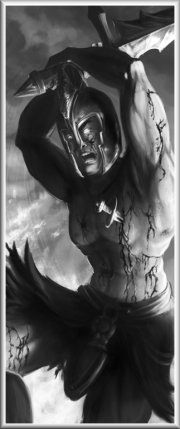
ARES BY ALYANA
LIST OF DEITIES
ASSOCIATED WITH ARES
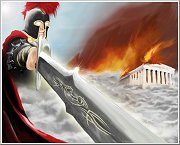
CLICK TO ENLARGE

[HOME] [MYTHOLOGY'S
EFFECTS ON MODERN SOCIETY][OLYMPIANS]
[GALLERY] [MAJOR
GODS] [MINOR
GODS] [HEROES]
[CONTACT]
[LOVE STORIES]
[MYTH OF THE
MONTH] [FUN
STUFF] [CREATURES]
